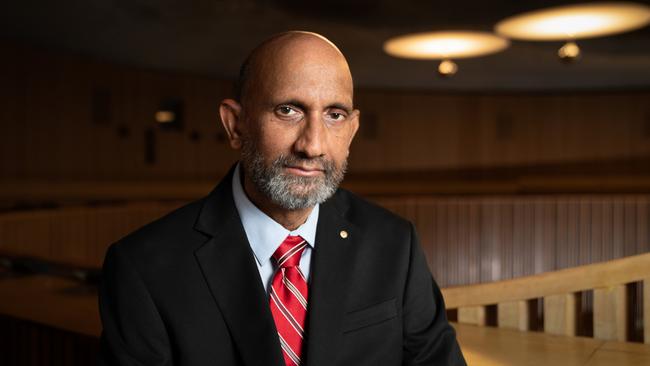Tough security rules will impact science, says academy president
Top scientist warns that tough AUKUS security restrictions on sensitive technology will impact Australia’s broader scientific effort.

A leading Australian scientist whose work in nanotechnology and semiconductors has applications ranging from healthcare to sustainable energy to defence and security has warned that new rules to put a “tall fence” around AUKUS secrets will impact scientific research.
Australian Academy of Science president Chennupati Jagadish told a Canberra symposium on Tuesday that the federal government’s proposed defence trade controls amendment bill, which puts sharp restrictions around sensitive research, would require investment to build secure research facilities and to train the research workforce on the ever-changing list of sensitive research areas.
The proposed legislation will make it illegal to share research in sensitive areas with foreigners in Australia, except for those from the US or the UK.
It is one of the building blocks for the so-called pillar two of the AUKUS agreement, which clears the way for sensitive defence research collaboration between the US, the UK and Australia in areas such as quantum sensing and communications, artificial intelligence, hypersonic flight and undersea technologies.
Professor Jagadish, a physicist who heads a research group at ANU, said the new legislation presented huge challenges, particularly because Australia was heavily reliant on international research partnerships.
He said Australia was above the OECD average in international scientific collaboration and 90 per cent of the top 50 cited papers by Australian researchers in the Web of Science in the past 10 years were co-authored with overseas collaborators.
“It is indisputable – international collaboration is the norm for researchers in Australia,” he told the symposium.
In 2021, 39 per cent of postgraduate research students in science in Australian universities were from overseas.
“For my research group, which consists entirely of PhD students, post-docs, technicians and senior researchers from countries other than the US and the UK, we will need permits for all that we do,” he said.
“And members of my group will need to operate in a closed environment to not unintentionally share knowledge that may have a dual use.
“Discussion at international conferences, where unpublished knowledge is shared freely to solve research problems and enable collaboration, seems unlikely if this bill becomes law.”
Professor Jagadish said the US used highly secure centres in universities to protect sensitive research, but funding was not currently available in Australia to copy that approach.
“If such structural change in the research architecture and system is required to address national security concerns, the Australian government will need to consider the resource implications of implementing such changes,” he said.
Professor Jagadish said he agreed that something needed to be done to protect sensitive technologies in today’s geopolitical environment.
“But we ought not to throw the baby out with the bathwater,” he said
Group of Eight universities chief executive Vicki Thomson said the issue was “a delicate balancing act”.
“It is critical to ensure we don’t jeopardise the valuable and strong research partnerships we have with other nations around the world,” she said.
“The Go8’s suggested approach is to ring fence AUKUS research so that we put tall fences around small paddocks and protect that which must be protected but not at the expense of broader research collaboration.”




To join the conversation, please log in. Don't have an account? Register
Join the conversation, you are commenting as Logout